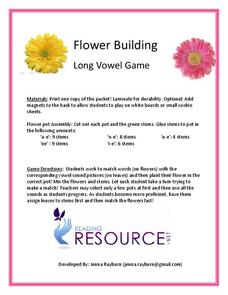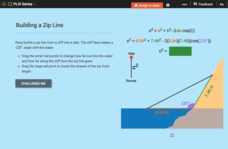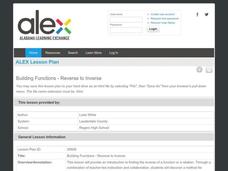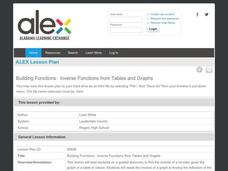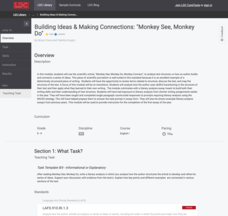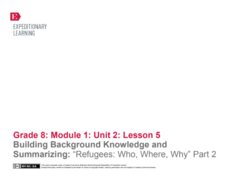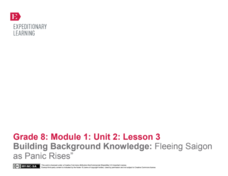Florida Department of Environmental Protection
Build Your Own Aquifer
Ever wondered how an aquifer works? Introduce your class to the amazing way many people get water by exploring how underground aquifers work. Two fun hands-on activities are used to help kids understand what an aquifer is, how it works,...
Building Background Knowledge: Learning About the Historical and Geographical Setting of Esperanza Rising
Set up your class to read Esperanza Rising, by Pam Munoz Ryan, through a class read-aloud and exploration of the setting. The detailed lesson plan outlines each step. First, class members read over the first few pages and focus on the...
PBS
Arthur's World Neighborhood: Building Global and Cultural Awareness
Kids become global anthropologists as they explore commonalities and differences both in their classroom and expanding across the globe. Throughout several activities, learners conduct partner interviews that culminate in Venn diagrams,...
Jen London
Building an Argument
Collect evidence and reasons and fill them in on this page to prepare for presenting an argument. Learners can evaluate what they are missing and make sure they fill in each line and bubble before considering their argument complete.
Reading Resource
Flower Building Long Vowel Game
Reading can be as lovely as a walk through the garden! Sets of flowers host words that share long vowel sounds, which kids match to the correct flowerpots.
Odell Education
Building Evidence-Based Arguments: “Doping can be that last 2 percent.”
Even the most thrilling sports career can end in an asterisk if the player uses performance-enhancing drugs. Focused on the topic of doping in sports, a seventh grade unit breaks down the arguments for and against steroids in five...
CK-12 Foundation
Law of Cosines: Building a Zip Line
Zip this resource into your lesson plans. Here is an interactive that shows how angles and lengths change based on conditions for a zip line. Scholars use the Law of Cosines to solve problems in this context.
CK-12 Foundation
Absolute Extrema and Optimization: Building the Biggest Box
Optimally, you want the largest box. Given a square piece of box material, pupils determine the size of congruent squares to cut out of the corners to create a box with the greatest volume. Learners determine the equation of the volume...
Alabama Learning Exchange
Building Functions: Reverse to Inverse
Reverse the wrapping to get to the gift. Using the idea of unwrapping a gift, the lesson introduces the concept of inverses. Pupils first determine the order needed to evaluate a function at a point, then use the reverse to find the...
Alabama Learning Exchange
Building Functions: Inverse Functions from Tables and Graphs
Is the inverse a function? Scholars learn how to examine a function to answer this question. Using an online interactive, they examine the properties of inverse functions to compare to the original function.
Santa Monica-Malibu Unified School District
Parts of Speech Nouns: Building Blocks of Grammar
An engaging PowerPoint presentation helps scholars learn the definition of a noun and provides examples of different types of nouns, such as person, place, abstract, and concrete nouns. Formative assessments within the resource check...
Facebook
Building Your Activist Network
Can social media bring activists together? Learners gain experience in using online media tools to raise awareness during a hands-on activity from a digital citizenship library. Once they identify a cause, groups create a unified message...
Literacy Design Collaborative
Building Ideas and Making Connections: "Monkey See, Monkey Do"
Reading a scientific article about cross-species synchronization may sound like a yawner. But "Monkey See, Monkey Do" is a fascinating tale that just happens to be about yawning, within and across species. After a close reading, class...
EngageNY
Building Background Knowledge and Summarizing: “Refugees: Who, Where, Why” Part 2
What are some universal aspects of refugees' experiences worldwide and throughout history? Scholars read the text "Refugees: Who, Where, Why" and create two class anchor charts. Finally, they each write a paragraph that provides an...
EngageNY
Building Background Knowledge: "Fleeing Saigon as Panic Rises”
How can scholars better understand the refugee experience? Pupils read Fox Butterfield's article "Panic Rises in Saigon, but the Exits are Few" and connect it to the novel Inside Out & Back Again. They annotate the text, looking for...
EngageNY
Building Background Knowledge, Predicting, and Focusing on Key Vocabulary: “Refugees: Who, Where, Why”
Using the fourth of 20 lessons from the Grade 8 ELA Module 1, Unit 2 series, scholars discuss refugees' challenges when finding a place to call home. They also read and answer text-based questions about the informational passage...
EngageNY
Building Background Knowledge: Guided Practice to Learn about the History of Wars in Vietnam
Scholars use a map of Asia to help them better understand the article "The Vietnam Wars," focusing on word meaning in the title and subtitle. Learners then use guided notes while reading the article and discuss their ideas with partners.
EngageNY
Building Background Knowledge: Small-Group Work to Learn More about the History of Wars in Vietnam
Scholars take a close look at "The Vietnam Wars." They answer questions and discuss in groups to conclude that the author respects the Vietnamese. They participate in a modified jigsaw discussion and end the exercise with a quick writing...
EngageNY
Building Background Knowledge: Vietnam as a “Battleground in a Larger Struggle”
Read. Stop. Think. Scholars use a reading strategy to process the challenging text, "The Vietnam Wars." They read a paragraph and then stop to think about the text and its meaning. Readers then go on to work with partners and make notes...
EngageNY
Building Background Knowledge: The Impending Fall of Saigon
Scholars read "Doc-Lap at Last" and participate in a Three Threes in a Row activity in which they answer three questions about the text in their rows. They then discuss the central idea of the text. Readers finish the lesson plan with a...
Radford University
Transformational Graphing in the Real World: Building Bridges
No suspension here, the resource is good to go. Using graphing calculators, scholars explore how transformations affect the graphs of quadratic functions. They consider how the changes relate to the context of suspension bridges.
EngageNY
Building Background Knowledge: “War in the Pacific,” Part 2
Who did what? Readers take a closer look at War in the Pacific to determine each country's actions. As they read, scholars underline American actions in one color and actions of Japan in another. They then begin completing Pearl Harbor...
EngageNY
Launching the Text: Building Background Knowledge on Louie Zamperini and World War II (Preface, Pages 3–6)
Scholars participate in a gallery walk to examine photographs related to WWII and record thoughts about the pictures in note catchers. At the end of the gallery walk, pupils share their observations before participating in a discussion...
EngageNY
Launching The Performance Task: Building Background Knowledge: “War in the Pacific,” Part 1
It's all about a bit of give and take. Scholars silently read War in the Pacific and circle any unfamiliar words. Using context clues, they write each word on a strip of paper along with the inferred definition. After looking the word up...
Other popular searches
- Vocabulary Building
- Toothpick Bridge Building
- Character Building
- Bridge Building
- Building Simple Machines
- Earthquake Proof Buildings
- Building a Simple Machine
- Building Self Esteem
- Building a Compound Machines
- Capitol Building
- Building Bridges
- Building a Human Skeleton






